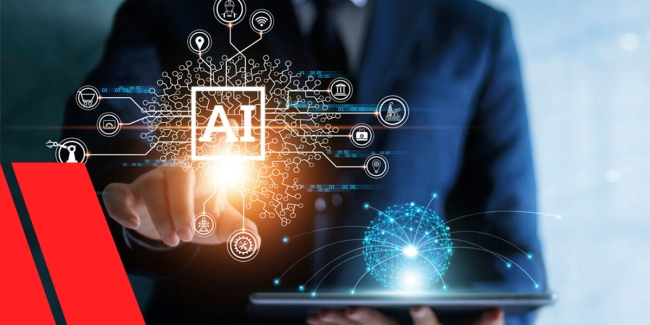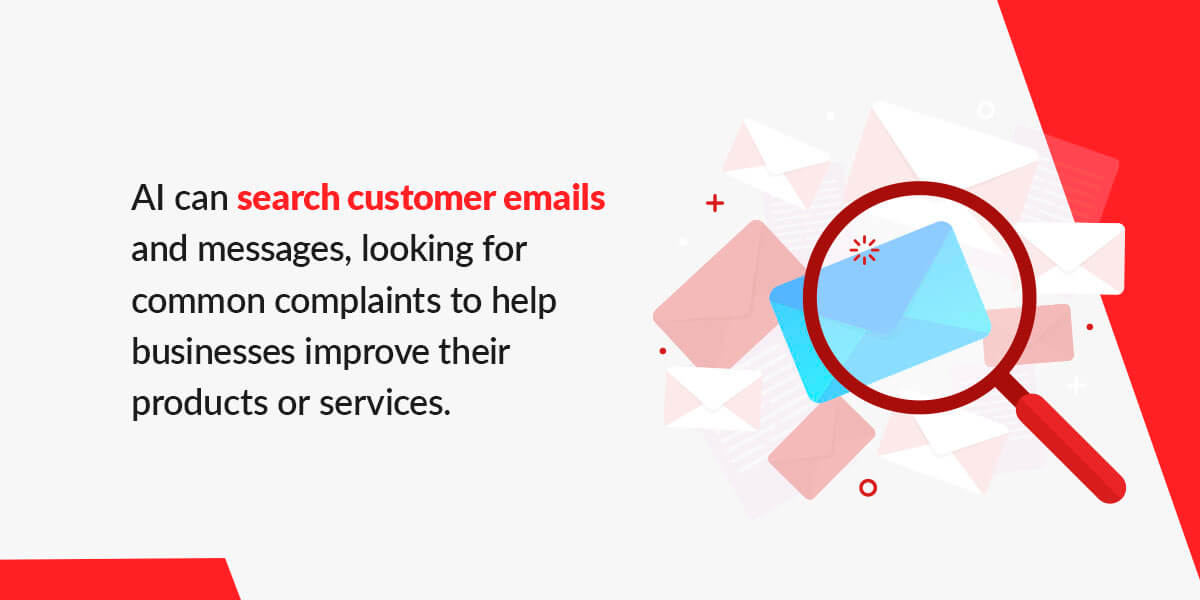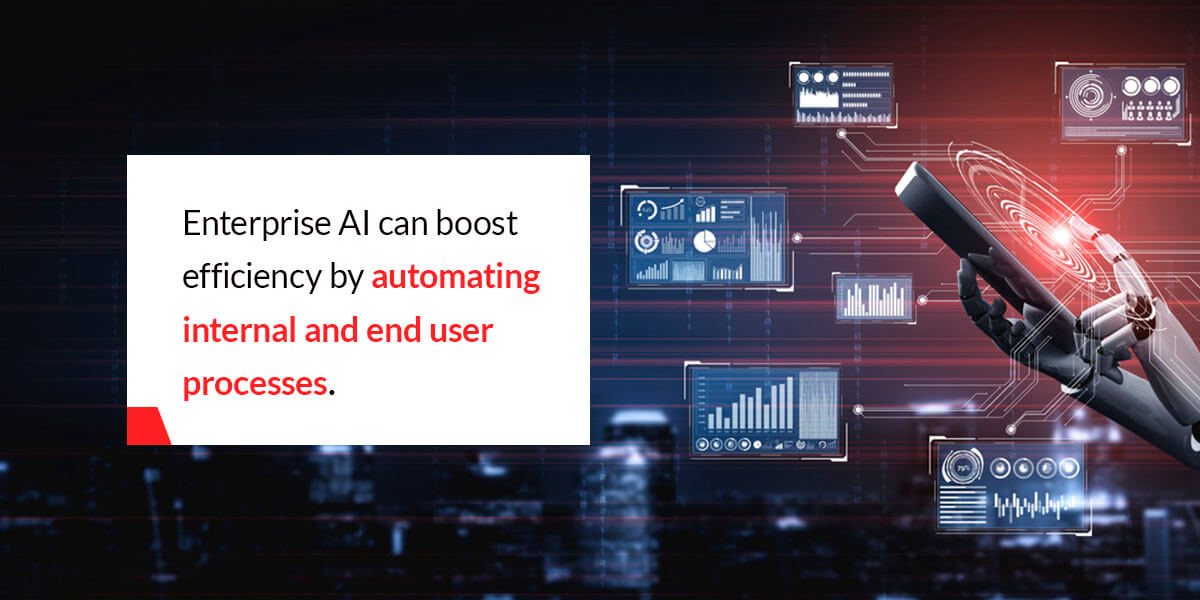Topics
Getting Started With Enterprise Generative AI

Did you know over 77% of businesses have implemented artificial intelligence or are considering it? Furthermore, 60% of companies have incorporated generative AI to create written, visual and audible content for their brands. Companies increasingly use AI software to streamline various tasks, including:
- Cybersecurity
- Customer support
- Supply chain optimization
- Learning and development
Installing a generative AI system is an ideal way to get your enterprise ready for the digital business transformation. Read on to learn about emerging trends and discover the significance of generative AI for enterprises.
What Is Enterprise Artificial Intelligence?
Enterprise AI combines technology that simulates human intellect to perform various tasks with software tailored to an organization's needs. It applies AI technologies within large companies to facilitate processes such as data collection and analysis, risk management and customer service.
Enterprise AI can organize data, boost security and simplify operations in multiple sectors, including health care, finance, fashion, manufacturing, transportation and retail.
Examples of AI Enterprise Applications
First, let's look at some examples of how businesses can implement enterprise AI.
1. Task Automation
Companies can use AI-based software to automate tedious manual tasks like customer service follow-up, sales lead identification, data entry and product recommendations. Employees can devote their energy to other projects, contributing to a more efficient workplace.
Virtual assistants are a growing AI enterprise trend for task automation. They aren't only for homes. Organizations can use these voice-based features to:
- Control smart devices like lights and thermostats.
- Access business calendars and other company information.
- Send text messages and make phone calls.
- Order products.
- Set up reminders.
- Search for information online, like products and reviews.
2. Fraud Detection
Businesses can use AI to monitor confidential information, comparing hundreds of data points to identify abnormalities. For example, the banking and finance industry often uses AI to detect fraudulent behavior in seconds. AI uses information like transaction and card issue locations, transaction times and amounts to find anomalies.
Once the server identifies a suspicious attempt, it can block the transaction and notify the primary user. AI can also recognize new fraud trends and patterns, adjusting its detection system as needed.
3. Customer Service Support
AI can use tools like smart assistants and chatbots to provide more efficient customer service and problem-solving. A chatbot's programming can interpret and mimic human conversation. Enterprises can leverage customer support chatbots for the following applications:
- Providing preset answers to specific questions
- Using machine learning capabilities to obtain information from the user
- Understanding different questions, words and phrases over time through natural language processing

AI can search customer emails and messages, looking for common complaints to help businesses improve their products or services. For example, banks and financial institutions can use enterprise AI software to generate large amounts of data. Virtual advisers can provide customized financial and investment advice for customers. They can facilitate several other aspects of their operations, like:
- Guided customer onboarding, account creation and identity verification
- Targeted product recommendations
- Short support wait times
- Personalized customer service via virtual assistants and chatbots
- Fraud detection
4. Supply Chain Management
AI is ideal for managing supply chain complexities. It can monitor traffic, login activity and server irregularities, alerting companies of changes. It can identify demand for different sales prices, locations, marketing strategies and other relevant data points in a supply chain.
Enterprise AI can help guide inventory flow from the manufacturer to distribution centers to customer-facing storefronts. It can use predictive analysis to determine the appropriate inventory quantities at different facilities.
Businesses can identify patterns, anticipate changes and plan accordingly. Then, they can improve efficiency, profitability, customer service and, ultimately, brand image.
5. Personalized Recommendations
At some point, you may have browsed a website and come across product suggestions similar to what you're looking for. E-commerce companies can use predictive AI analytics to examine online users' past purchases and browsing history. That way, they can recommend the most relevant products and reach the intended audiences.
Businesses can also use predictive analytics for anticipatory shipping models. They can predict customer purchases and stock inventory based on this data.
6. Learning and Development Opportunities
Your business can leverage AI for employee training and education. Everyone has preferred learning styles, whether in-person classes or self-guided online courses or videos. ML can help you tailor training program modules to these different styles.
For instance, your learning management system might:
- Include video tutorials.
- Auto-transcribe videos to text-based articles.
- Generate visuals based on text content.
- Suggest alternative training formats for course sections employees struggle with.
Enabling multiple options accommodates different learning needs, helping your employees feel seen and understood.
What Are the Benefits of Enterprise AI?
AI can provide various benefits for your organization. Here are some advantages of integrating enterprise AI into your company's operations.
1. Customer Satisfaction
Large enterprises are notorious for impersonal customer service and a cold, corporate feel. From more efficient response services to personalized product recommendations, organizations in various sectors can use AI to provide a more individualized experience for customers.
Rather than spending hours browsing your company's product or service listings, customers can use your targeted recommendations to find what they want. By giving customers a more tailored brand experience, enterprise AI can help your audience feel more seen and valued. As a result, they're more likely to return for future purchases.
Additionally, enterprise AI can streamline various tasks and processes and eliminate human error, yielding higher-quality products more quickly. Better product and service offerings also translate to greater customer satisfaction.
2. More Robust Security
An AI-based system can beef up your enterprise's security measures. It can detect red flags, anomalies and potential cybersecurity threats. It can then take corrective action as needed and notify the company of the attempt. To keep your business secure, it can reduce the risk of breaches by encrypting personal data and minimizing human error.
3. Improved Talent Management
Businesses use enterprise AI to screen for qualified candidates and simplify hiring. Advancements in NLP and speech recognition tools help chatbots provide more personalized services to employees and job candidates.
4. Increased Productivity
Enterprise AI can boost efficiency by automating internal and end user processes. It relieves employees of data entry and other mundane tasks, freeing time to manage other responsibilities.

5. Ongoing Growth and Development
As discussed earlier, enterprise AI enables you to customize training modules to employees' learning preferences. In turn, it can promote long-term learning and educational benefits. Employees can better grasp the material and content in a way they couldn't before.
Challenges and Risks of AI
While AI can benefit enterprises in multiple ways, it's crucial to be aware of its potential risks and challenges. Below are some general concerns surrounding AI.
1. Unintentional Bias
AI models and algorithms rely on human-provided training. Therefore, there could be inherent data biases present. These could lead to inaccurate or controversial results, which could stir some mistrust in a company.
2. Potential Job Losses
With AI's powerful ability to oversee numerous organizational tasks and lighten workloads, there are growing concerns about human job eliminations. AI caused nearly 4,000 job losses in May 2023, and statistics predict 73 million Americans will lose their jobs to automation by 2030.
3. Reduced Transparency
AI learning models can be challenging to understand, even for people who work closely with them. This difficulty can cause a lack of explanation for:
- What data points the algorithms use.
- Why and how AI produces results and makes decisions.
What Is Enterprise Generative AI?
Generative AI is artificial intelligence that uses algorithms to produce original content, such as photos, videos, audio, code and text. It learns the structure and patterns of input training data, creating new data with similar characteristics. Generative AI is increasing in individual and enterprise use cases. Organizations can use this tool to:
- Automate and streamline projects.
- Minimize the need for employees to complete repetitive manual tasks.
- Maintain high-volume production standards.
Generative AI Business Use Cases
Trends in AI for enterprise applications are constantly revolutionizing how organizations conduct their operations. Here are some emerging generative enterprise AI use cases to give you a better idea of this.
1. Product and Application Development
Many businesses are using generative AI to code different apps. They can also write product documentation for those applications. Companies can develop and maintain innovative products and custom applications to:
- Enhance workflow.
- Reduce marketing times.
- Simplify different business processes.
2. Code Generation
Generative AI can write large sets of software code for programmers and developers. It can also handle bug fixes and numerous types of documentation, making it an asset for quality assurance.
By automating these aspects of code production, generative AI can significantly accelerate the software development process. In turn, developers can create applications faster, enabling companies to introduce their products to the market sooner.
3. Content Creation
Large language models can use specific inputs and prompts to create original, relevant content for company websites, including:
- Blog posts and articles
- Product and service pages
- Social media accounts
By inputting a business' previously written content, users can instruct LLMs to:
- Mimic a human-like tone and voice.
- Reflect the company's unique writing style.
- Appeal to and engage the business' target audience.
4. Entertainment Media Development
With AI-generated photography, videography, audio and animation growing more realistic, companies are turning to generative AI to produce:
- Movie and video game graphics.
- Music and podcast audio.
- Characters for virtual reality and storytelling.
Amazingly, this means a human doesn't have to speak, go on camera or edit hours of footage to create realistic, engaging content for viewers. Generative AI tools are primarily for developing more interactive non-player characters and supplementing existing scripts. It is not capable of replacing screenwriters.
5. Data Analytics and Performance Reporting
Generative AI can absorb massive amounts of data and text to summarize critical points. That's why it's become a valuable tool for business performance reporting. It's beneficial for qualitative and unstructured data analytics. These data types typically require more processing before the system can draw insights.
Employers can also use generative AI to develop personalized employee learning plans based on their performance review outcomes. ChatGPT and other generative AI platforms can recommend specific learning content based on employees' work output and their desired career paths.
6. Predictive Maintenance and Manufacturing Optimization
Many materials-based industries — such as manufacturing and pharmaceuticals — use generative AI for a process called “inverse design.” Inverse design essentially flips the traditional product design process, reverse-engineering new materials by inputting a set of specific characteristics and properties.
The AI model then uses an algorithm to predict a solution. Inverse design in generative AI helps companies produce new materials that fulfill the necessary properties for that environment.
Generative AI can use input data to create timelines and to-do lists, making it useful for manufacturing and predictive equipment maintenance. It can provide recommendations for repairs and workflow, facilitating the process of complex data analysis from sensors and other production line components.
By training a generative AI predictive model, manufacturing companies can predict equipment breakdowns more accurately, accounting for potential future malfunctions. Generative AI is radically transforming modern manufacturing, providing opportunities for companies to better meet their production goals and create more innovative designs.
7. Team Learning and Development Solutions
Even with HR technology, data collection and analysis can be labor-intensive, exhaustive and time-consuming. Enterprise AI can compute large amounts of data from multiple sources, identifying knowledge gaps to improve learning and development strategies.
For example, you can use AI-based software to conduct performance reviews, address improvement areas and gather employee feedback. It can also help predict knowledge gaps for new hires, allowing you to be more proactive in your succession planning. ML can provide multiple benefits for your learning and development programs:
- Personalized learning
- Faster course completion rates
- Easier accessibility
- Improved information retention
- Shortened learning curves
- Removed biases from training
- Improved employee experiences and workplace culture
How to Implement AI in Your Business
You may wonder where to start introducing an enterprise AI software system for your organization. We recommend the steps below to get started.
1. Familiarize Yourself With AI
To start, set aside some time to get acquainted with modern AI features. Take advantage of the available online resources to build your knowledge and learn the ropes of this technology. That way, when you incorporate an enterprise AI system, you'll have a basic understanding of predictive analytics, ML, NLP and other aspects of AI.
2. Find Problem-Solving Opportunities
Once you're up to speed on AI fundamentals, you can start thinking about ways to add it to your existing services and products. What are some improvement areas AI could help solve? Some examples might include:
- Developing a better merchandise planning system
- Improving your cybersecurity and data-safeguarding protocols
- Facilitating your job candidate search and hiring process
3. Choose a Reliable Software Provider to Assist You
Finally, you'll need a reputable third party to help you develop and integrate a custom AI system. At Computer Generated Solutions, we provide clients with innovative tools to help them solve various information technology, digital learning and development and supply chain challenges.
Our team is well-versed in sales and customer support, and we use these backgrounds to help clients enhance these aspects of their organizations. Whether you face challenges in logistics, product development, finances or other facets of your business, CGS is here for you.
Our customized digital corporate learning solutions improve operational performance, engage employees and boost retention. CGS partners with innovative companies to enhance their learning outcomes. We offer numerous platforms geared toward learning and development.
- eLearning: We deliver high-quality, comprehensive eLearning services combining advanced technologies with award-winning experience. That way, you can incorporate learning programs that align with your company culture. Our solutions include gamification and simulations, mobile learning and video and vignettes.
- Blended learning: Blended learning integrates multiple employee training strategies — like instructor-guided training, digital learning and experiential technology — to maximize employee performance and retention. We'll help you identify and implement the most effective learning methods for your company.
- Instructor-led training: We provide in-person and virtual instructor-led training solutions. These sessions enable engaging face-to-face interaction, collaborative training, hands-on workshops and stronger connections between learners and instructors.
- Learning consulting: Our consultants can help you devise learning strategies based on feedback, needs assessments and digital acumen.
- Augmented reality for learning: Our immersive TeamworkAR™ learning and development platform comes with various features that support real-time employee training and support from anywhere. You can access AR collaboration tools, built-in business metrics, visualization tools, robust security and 24/7 support.
Contact CGS for Enterprise AI Solutions Today
With technology constantly shifting the way companies operate, it's vital to keep your finger on the pulse of new trends and technologies. At CGS, we're passionate about helping businesses acclimate to the ever-evolving digital world. With our learning and development solutions, your team can grow and come together in a powerful way.
We serve clients in a range of industries, including technology, retail, health care, fashion, finance and hospitality. We understand every organization has specific needs. Our team can work with you to customize an effective AI learning and development solution for your unique operations.
Boost your enterprise AI strategy with CGS. Contact us today to learn more about how we promote artificial intelligence for enterprise learning applications!
Linked Sources:
- https://explodingtopics.com/blog/companies-using-ai
- https://www.mckinsey.com/capabilities/quantumblack/our-insights/the-state-of-ai-in-2023-generative-ais-breakout-year
- https://www.cgsinc.com/en/industry/professional-services
- https://www.cgsinc.com/blog/3-ways-leverage-ai-and-machine-learning-training-lrn
- https://www.cgsinc.com/en/bluecherry/quality-control-management
- https://www.cgsinc.com/en/learning/learning-talent-solutions
- https://www.cbsnews.com/news/ai-job-losses-artificial-intelligence-challenger-report/
- https://techjury.net/blog/jobs-lost-to-automation-statistics/
- https://www.cgsinc.com/en/technology-outsourcing/application-development-maintenance
- https://www.cgsinc.com/en/bluecherry/bluecherry-omnichannel-planning
- https://www.cgsinc.com/en/learning
- https://www.cgsinc.com/en/learning/elearning
- https://www.cgsinc.com/en/learning/blended-learning
- https://www.cgsinc.com/en/learning/instructor-led-training
- https://www.cgsinc.com/en/learning/learning-consulting-services
- https://www.cgsinc.com/en/augmented-reality-learning-and-development
- https://www.cgsinc.com/en/contact


